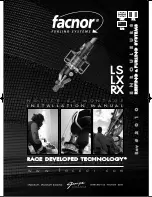
iCAP Customer Familiarisation Manual
Page 50 of 72
This document is part numbered 849940090071
Version 1.02
8.1.3 Spray Chamber Cleaning
If the spray chamber becomes greasy and droplets form on the inside soak the spray chamber in
a dilute analytical-grade surfactant for five minutes.
If the spray chamber becomes dirty or deposits form inside it, soak the spray chamber in a 10 %
acid solution for two hours (a mixture of nitric and hydrochloric acid is normally suitable). After
cleaning rinse the spray chamber in deionized water.
8.1.4 Nebulizer Cleaning
Rinse with deionized water, dilute acid or organic solvent at the end of each day, or aspirate a
cleaning solution through it.
Warning: Do not put the concentric nebulizer in an ultrasonic bath or heat it in an
oven.
▲
8.1.5 Purged Optical Path Window Cleaning
Before attempting to clean the Purged Optical Path (POP) window (note: there is also one below
the torch on a Duo configuration instrument) turn off the plasma and allow thirty minutes for any
hot areas to cool down.
Open the small access door next to the sample compartment door and withdraw the POP window
assembly. Clean the POP window using a lint free cloth and clean water. Repeat the cleaning
process using methanol then, when dry, re-insert the POP window into the fore optic assembly.
Warning: Do not open this access door when the plasma is running, there is a
potential UV radiation hazard. All mirrors in the optical system are coated so be
sure not to touch the mirror below the radial view POP window in the Duo
configuration.
▲
If further cleaning is necessary, remove the quartz window from the POP window holder and soak
in a 10 % acid solution for two hours (a mixture of nitric and hydrochloric acid is normally
suitable). After acid soaking rinse in de-ionized water, then with a volatile, zero residue, organic
solvent (propanol is suitable) to aid drying.
The radial view window below the torch on a Duo instrument can be treated in the same way.
8.2 Preventive Maintenance
Although minimum user maintenance is required, periodic checking of performance is required by
many laboratories. This is particularly important for customers subject to external standards and
regulations (for example ISO9000, EPA or UKAS). Details of these options are available from a
local Thermo Fisher Office.
All electrical supplies, gas supplies and extraction must be checked to ensure local health and
safety guidelines and regulations are complied with. The gas and cooling water should be
checked for leaks at regular intervals.
8.2.1 Water Chiller
It is important that the cooling fluid used is made up correctly as specified in the Site Guide (Pre-
installation Guide).
Содержание iCAP 7000 Series
Страница 36: ...iCAP Customer Familiarisation Manual Page 36 of 72 This document is part numbered 849940090071 Version 1 02 ...
Страница 48: ...iCAP Customer Familiarisation Manual Page 48 of 72 This document is part numbered 849940090071 Version 1 02 ...
Страница 58: ...iCAP Customer Familiarisation Manual Page 58 of 72 This document is part numbered 849940090071 Version 1 02 ...
















































